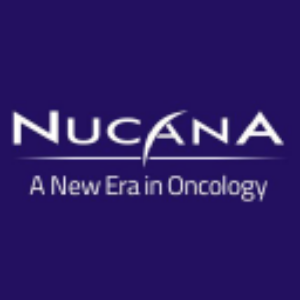NuCana Presents Encouraging Data on NUC-7738 in Combination with Pembrolizumab in PD-1 Inhibitor Refractory and Resistant Melanoma Patients at the ESMO Congress 2024
Rhea-AI Summary
NuCana plc (NASDAQ: NCNA) presented final data from the Phase 2 NuTide:701 study at the ESMO Congress 2024, showcasing encouraging results for NUC-7738 in combination with pembrolizumab for metastatic melanoma patients refractory to or relapsed on prior PD-1 inhibitor therapy. The study, involving 12 patients, demonstrated a 75% disease control rate, including two partial responses. Notably, 7 out of 12 patients achieved progression-free survival exceeding five months, which is significant for this patient population. The combination therapy also exhibited a favorable safety profile. NUC-7738's mechanism of action, targeting multiple aspects of the tumor microenvironment, is believed to sensitize PD-1 resistant tumors to rechallenge with PD-1 inhibitors.
Positive
- 75% disease control rate achieved in metastatic melanoma patients resistant to PD-1 inhibitors
- 7 out of 12 patients showed progression-free survival exceeding 5 months, surpassing typical outcomes
- Favorable safety profile observed for the NUC-7738 and pembrolizumab combination
- Potential for NUC-7738 to sensitize other PD-1 inhibitor resistant tumor types
Negative
- Small sample size of only 12 patients in the study
- Full efficacy and long-term survival data not yet available
Insights
The data presented by NuCana on NUC-7738 in combination with pembrolizumab is highly promising for metastatic melanoma patients who have become resistant to PD-1 inhibitors. The 75% disease control rate and prolonged progression-free survival in this heavily pretreated population are particularly noteworthy. The
From a clinical perspective, these results are very encouraging. Patients with PD-1 inhibitor-resistant melanoma typically have treatment options and poor outcomes. The fact that 7 out of 12 patients achieved progression-free survival of over five months is remarkable, considering the expected median of 2-3 months with current standards of care. The two partial responses, including one with a
This clinical data represents a significant positive development for NuCana (NASDAQ: NCNA). The company's NUC-7738, in combination with pembrolizumab, shows promise in addressing a critical unmet need in the lucrative melanoma market. If further studies confirm these results, NuCana could potentially capture a substantial share of the PD-1 inhibitor-resistant patient population. The broader implications for other tumor types could significantly expand the drug's market potential. However, investors should note that larger trials are still needed and the path to market approval remains long. The positive data may attract partnership opportunities or increase the company's appeal as an acquisition target. While this news is likely to positively impact NuCana's stock in the short term, long-term value will depend on successful progression through later-stage trials and eventual commercialization.
Combination of NUC-7738 plus Pembrolizumab Resulted in Prolonged Progression Free Survival, a Compelling Disease Control Rate including Partial Responses, and a Favorable Safety Profile
BARCELONA, Spain, Sept. 14, 2024 (GLOBE NEWSWIRE) -- NuCana plc (NASDAQ: NCNA) presented final data from the Phase 2 NuTide:701 study at the ESMO Congress on NUC-7738 in combination with pembrolizumab for patients with metastatic melanoma who were refractory to or had relapsed on prior PD-1 inhibitor therapy.
In this cohort of 12 patients, most of whom had received at least two prior lines of PD-1 inhibitor therapy, nine (
NUC-7738’s ability to sensitize PD-1 resistant tumors to rechallenge with PD-1 inhibitors is believed to be due to its ability to target multiple aspects of the tumor microenvironment (TME) via the disruption of RNA polyadenylation and subsequent changes to gene expression in cancer cells. In support of this hypothesis, data presented from tumor biopsies obtained before and after NUC-7738 based treatment demonstrated increases in genes related to antigen presentation and T-cell activation.
Hugh S. Griffith, NuCana’s Founder and Chief Executive Officer said: “We are very excited to share these data on NUC-7738 in combination with pembrolizumab in PD-1 inhibitor refractory and resistant patients with melanoma. Outcomes in this patient population are very poor, with median progression free survival of 2-3 months with the current standard of care, so we are very encouraged that the majority of patients who received this combination achieved a progression free survival of more than five months.”
Mr. Griffith continued: “The translational data that has been generated in this study and in previous non-clinical studies give us confidence that the effects we are seeing are a result of NUC-7738 making previously resistant tumors sensitive to rechallenge with PD-1 inhibitors by targeting multiple aspects of the tumor microenvironment. Our data on NUC-7738 obtained in other tumor types indicate that this phenomenon is not restricted to melanoma and that NUC-7738 may have the ability to sensitize other PD-1 inhibitor resistant tumor types. We look forward to sharing our development plans for NUC-7738 in the near future.”
About NuCana
NuCana is a clinical-stage biopharmaceutical company focused on significantly improving treatment outcomes for patients with cancer by applying our ProTide technology to transform some of the most widely prescribed chemotherapy agents, nucleoside analogs, into more effective and safer medicines. While these conventional agents remain part of the standard of care for the treatment of many solid and hematological tumors, they have significant shortcomings that limit their efficacy and they are often poorly tolerated. Utilizing our proprietary technology, we are developing new medicines, ProTides, designed to overcome the key limitations of nucleoside analogs and generate much higher concentrations of anti-cancer metabolites in cancer cells. NuCana’s pipeline includes NUC-3373 and NUC-7738. NUC-3373 is a new chemical entity derived from the nucleoside analog 5-fluorouracil, a widely used chemotherapy agent. NUC-3373 is currently being evaluated in two ongoing clinical studies: a Phase 1b/2 study (NuTide:302) in combination with leucovorin, irinotecan or oxaliplatin, and bevacizumab in patients with metastatic colorectal cancer; and a Phase 1b/2 modular study (NuTide:303) of NUC-3373 in combination with the PD-1 inhibitor pembrolizumab for patients with advanced solid tumors and in combination with docetaxel for patients with lung cancer. NUC-7738 is a novel anti-cancer agent that disrupts RNA polyadenylation, profoundly impacts gene expression in cancer cells and targets multiple aspects of the tumor microenvironment. NUC-7738 is in the Phase 2 part of a Phase 1/2 study (NuTide:701) which is evaluating NUC-7738 as a monotherapy in patients with advanced solid tumors and in combination with pembrolizumab in patients with melanoma.
Forward-Looking Statements
This press release may contain “forward-looking” statements within the meaning of the Private Securities Litigation Reform Act of 1995 that are based on the beliefs and assumptions and on information currently available to management of NuCana plc (the “Company”). All statements other than statements of historical fact contained in this press release are forward-looking statements, including statements concerning the Company’s planned and ongoing clinical studies for the Company’s product candidates and the potential advantages of those product candidates, including NUC-3373 and NUC-7738; the initiation, enrollment, timing, progress, release of data from and results of those planned and ongoing clinical studies; the Company’s goals with respect to the development, regulatory pathway and potential use, if approved, of each of its product candidates; and the utility of prior non-clinical and clinical data in determining future clinical results. In some cases, you can identify forward-looking statements by terminology such as “may,” “will,” “should,” “expects,” “plans,” “anticipates,” “believes,” “estimates,” “predicts,” “potential” or “continue” or the negative of these terms or other comparable terminology. Forward-looking statements involve known and unknown risks, uncertainties and other factors that may cause the Company’s actual results, performance or achievements to be materially different from any future results, performance or achievements expressed or implied by the forward-looking statements. These risks and uncertainties include, but are not limited to, the risks and uncertainties set forth in the “Risk Factors” section of the Company’s Annual Report on Form 20-F for the year ended December 31, 2023 filed with the Securities and Exchange Commission (“SEC”) on March 20, 2024, and subsequent reports that the Company files with the SEC. Forward-looking statements represent the Company’s beliefs and assumptions only as of the date of this press release. Although the Company believes that the expectations reflected in the forward-looking statements are reasonable, it cannot guarantee future results, levels of activity, performance or achievements. Except as required by law, the Company assumes no obligation to publicly update any forward-looking statements for any reason after the date of this press release to conform any of the forward-looking statements to actual results or to changes in its expectations.
For more information, please contact:
NuCana plc
Hugh S. Griffith
Chief Executive Officer
+44 131-357-1111
info@nucana.com
ICR Westwicke
Chris Brinzey
+1 339-970-2843
chris.brinzey@westwicke.com








